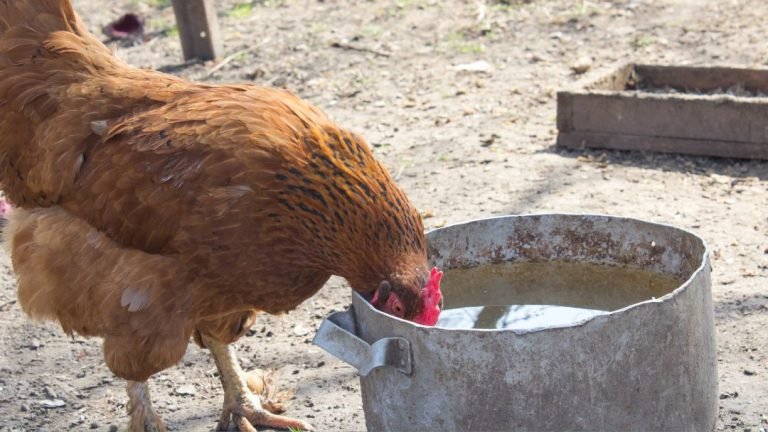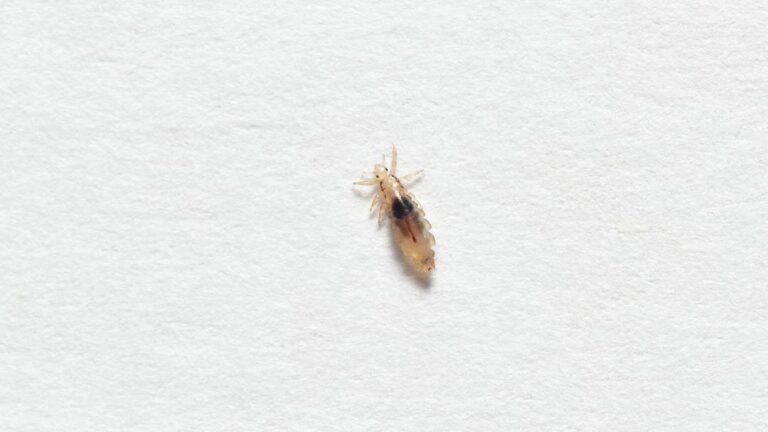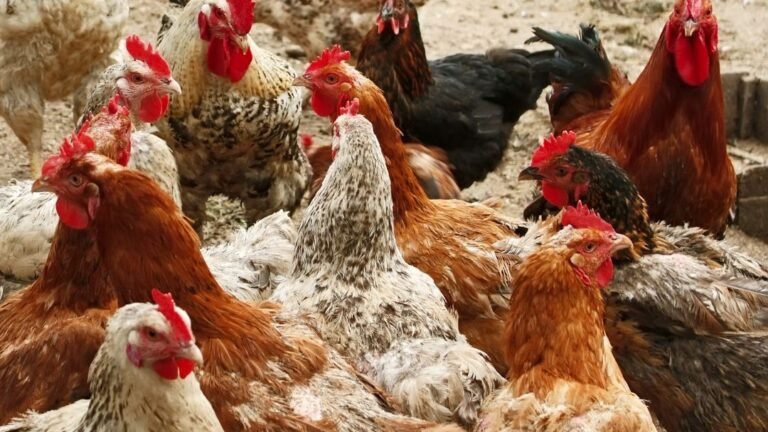Yes, overfeeding chickens can lead to health problems and obesity. Introducing excessive food can harm their digestion and overall well-being.
Chickens are generally voracious eaters, but providing them with too much food can have negative consequences. Overfeeding can lead to digestive issues such as impacted crops, crop stasis, or sour crop, where food fails to move through the digestive system properly.
Additionally, chickens may consume excess calories, leading to obesity and associated health problems like heart disease and reduced mobility. It is essential to understand their nutritional needs and provide them with a balanced diet to ensure optimal health and well-being. By monitoring their food intake and avoiding overfeeding, you can help keep your chickens in good shape and prevent potential health complications.
Understanding The Dangers Of Overfeeding Chickens
Understanding the Dangers of Overfeeding ChickensH3: Overfeeding and its impact on chicken healthOverfeeding chickens can have detrimental effects on their overall health and well-being. While it may be tempting to provide your feathered friends with an abundance of food, it is essential to understand the potential consequences of overindulging them. Overfeeding can lead to various health issues, including obesity, digestive problems, and a decrease in egg production.Excessive food consumption can result in obesity among chickens. Similar to humans, overweight chickens are at a higher risk of developing health problems such as heart disease and joint issues. The excess weight puts strain on their joints, making it difficult for them to move around and engage in normal chicken activities.H3: Common signs of overfeeding in chickensSpotting the signs of overfeeding in chickens is crucial to prevent long-term health complications. Here are some common indicators that your chickens may be consuming too much food:1. Weight gain: If you notice your chickens rapidly gaining weight or becoming notably larger in size, it could be a sign of overfeeding. Regularly monitoring their weight can help prevent obesity-related health problems.2. Decreased activity: Overfed chickens tend to become lethargic and less active. They may spend more time resting or sitting down, rather than engaging in their usual pecking, scratching, and foraging behaviors.3. Reduced egg production: Chickens that are overfed often experience a decrease in egg production. This is because their bodies allocate energy towards digesting excess food rather than producing eggs. If you notice a significant drop in egg numbers from your flock, overfeeding could be a contributing factor.4. Fecal abnormalities: Chickens that are overfed may produce loose, watery, or foul-smelling droppings. This can indicate digestive issues caused by too much food intake.H3: The importance of portion controlImplementing proper portion control is crucial in maintaining the overall health and well-being of your chickens. By carefully managing their food intake, you can avoid the risk of overfeeding and its associated problems.1. Calculate appropriate portions: It is vital to provide your chickens with the right amount of feed based on their breed, age, and activity level. Consulting a poultry nutritionist or veterinarian can help you determine the ideal portion sizes for your flock.2. Feed quality over quantity: Instead of focusing on the quantity of food, prioritize the quality of the feed. Opt for high-quality, nutritionally balanced feed that meets the dietary requirements of your chickens.3. Scheduled feeding: Establishing a feeding schedule ensures that chickens receive their meals at regular intervals, preventing them from consuming excessive food in a short period. Dividing the daily portion into several small meals can also help with portion control.Remember, a well-balanced diet and proper portion control are key to maintaining the health and happiness of your feathered companions. By being mindful of their nutritional needs and avoiding overfeeding, you can help them thrive and live a long and healthy life.Maintaining A Balanced Diet For Your Flock
Maintaining a Balanced Diet for Your FlockThe nutritional needs of chickensFeeding chickens a well-balanced diet is crucial to their overall health and productivity. Just like humans, chickens require a varied diet to meet their nutritional needs. Whether you are raising chickens for eggs, meat, or simply as pets, understanding their dietary requirements is essential.Choosing the right chicken feedWhen it comes to choosing the right chicken feed, there are a few factors to consider. The age of your birds is an important factor in determining their feed requirements. Chicks, for example, need a starter feed that is high in protein to support their growth and development. As they mature, they can transition to a grower feed with slightly lower protein content. Finally, adult chickens will thrive on a layer feed specially formulated to meet their needs for egg production. Make sure to check the packaging for the recommended feeding instructions based on the age and purpose of your flock.Incorporating a variety of foods for optimal healthApart from their formulated feed, chickens can benefit from a variety of additional foods to ensure optimal health and well-being. By offering a range of foods, you not only provide essential nutrients but also give them mental stimulation and prevent boredom. Here are some examples of food you can incorporate into their diet:1. Fresh fruits and vegetables: Chickens love to peck at fresh fruits and veggies. Consider offering them leafy greens, such as spinach or kale, as well as fruits like watermelon or berries. These treats are packed with vitamins and minerals that contribute to a healthy immune system.2. Protein-rich foods: Supplementing their diet with protein-rich foods is especially important during molting or when chickens are experiencing stress. Options include mealworms, cooked eggs, or even small amounts of cooked meat.3. Calcium sources: To maintain strong eggshells, hens require calcium-rich foods. Crushed oyster shells or eggshells can be provided either separately or mixed into their feed.In addition to these specific foods, always ensure a constant supply of fresh, clean water, as chickens need it for digestion and overall hydration.In conclusion, maintaining a balanced diet for your flock is essential for their health, productivity, and overall well-being. By understanding their nutritional needs, choosing the right feed, and incorporating a variety of foods, you can ensure that your chickens are receiving all the essential nutrients they require. Remember to consult your veterinarian or poultry expert if you have any specific concerns or questions regarding your chickens’ diet.Implementing Feeding Strategies For A Healthy Flock
Feeding chickens is an important aspect of raising a healthy flock. Just like any other animal, chickens require a balanced diet to thrive and reach their full potential. However, it’s essential to understand that overfeeding can have detrimental effects on your chickens’ health. In this article, we will explore the different aspects of implementing feeding strategies for a healthy flock, including establishing a feeding schedule, the role of free-ranging in chicken nutrition, and offering treats in moderation.
Establishing A Feeding Schedule
Setting up a feeding schedule is crucial for maintaining the well-being of your chickens. Consistency in feeding times helps your flock develop a routine and keeps their digestive system in check. This also helps to prevent overeating and excess weight gain, which can lead to various health issues in chickens.
When creating a feeding schedule, it’s important to consider factors such as the age, size, and breed of your chickens. For example, younger chicks may require more frequent feedings compared to fully-grown chickens. Additionally, you should also account for the season and climate, as chickens may have different nutritional needs during colder months.
Here’s an example of a simple feeding schedule:
| Time | Feed |
|---|---|
| Morning | High-quality poultry feed |
| Midday | Access to fresh water and free-ranging |
| Evening | High-quality poultry feed |
The Role Of Free-ranging In Chicken Nutrition
Allowing your chickens to free-range can contribute to their overall nutrition. When given the opportunity to roam and forage freely, chickens can supplement their diet with insects, seeds, grass, and other natural food sources. This not only adds variety to their diet but also provides essential nutrients.
Free-ranging encourages physical activity, which aids in digestion and helps chickens maintain a healthy weight. Additionally, it helps chickens express their natural foraging behavior, resulting in happier and more satisfied birds. However, it’s important to ensure the safety of your flock during free-ranging, as predators and other hazards can pose a threat.
Offering Treats In Moderation
While treats can be a fun addition to your chickens’ diet, it’s crucial to offer them in moderation. Treats should not replace their main diet and should only make up a small percentage of their overall food intake. Too many treats can lead to malnutrition, obesity, and other health problems.
When choosing treats for your flock, opt for healthy options such as fruits, vegetables, and grains. Avoid sugary and high-fat treats as they can be harmful to chickens. It’s also important to introduce treats gradually and observe how your chickens react to them. If any digestive issues or abnormal behavior arise, it may be necessary to adjust or eliminate certain treats from their diet.
By implementing a feeding schedule, allowing free-ranging, and offering treats in moderation, you can ensure a healthy and happy flock. Remember to provide clean and fresh water at all times, as hydration is just as crucial as a balanced diet. By prioritizing their nutritional needs, you’ll be rewarded with thriving and contented chickens.
Identifying And Addressing The Risks Of Overfeeding
Identifying and Addressing the Risks of Overfeeding
Obesity In Chickens And Its Consequences
Obesity in chickens is a serious concern that can lead to various health problems. Just like humans, excessive food consumption can cause chickens to gain an unhealthy amount of weight. This can result in a range of issues, including decreased mobility, joint problems, and compromised immune system. Obese chickens are also more prone to reproductive disorders and respiratory difficulties.
Health Issues Associated With Overfeeding
Overfeeding chickens can have detrimental effects on their overall health. Here are some common health issues associated with overfeeding:
- Malnutrition: When chickens are overfed, they may consume too much of nutritionally imbalanced food, leading to deficiencies in essential nutrients.
- Impacted Crop: Overeating can cause the crop, the muscular pouch in a chicken’s esophagus, to become impacted. This can result in discomfort, difficulty in breathing, and potential life-threatening complications.
- Heart and Liver Problems: Excessive fat accumulation due to overfeeding can strain the cardiovascular system and liver, increasing the risk of heart diseases and liver dysfunction.
- Reduced Egg Production: Overfed hens may experience a decline in egg production as their bodies divert energy towards fat storage instead of egg laying.
Tips For Preventing Overfeeding
Preventing overfeeding is crucial for maintaining the health and well-being of your chickens. Here are some practical tips to ensure they receive the right amount of food:
- Follow Recommended Feeding Guidelines: Consult a poultry expert or refer to feeding guidelines provided by reputable sources to determine the appropriate quantity of feed according to the age, breed, and size of your chickens.
- Monitor Feeding Habits: Regularly observe your chickens’ behavior during mealtime and ensure that they are not excessively consuming or leaving a significant amount of leftover feed.
- Provide a Balanced Diet: Offer a diversified diet that includes a mix of grains, seeds, vegetables, and proteins to ensure your chickens receive all necessary nutrients without overindulging in one particular food group.
- Use Feeding Equipment: Implement proper feeding equipment, such as feeders designed to minimize wastage and control food portions. Using treadle feeders or timed-release feeders can help prevent chickens from freely accessing food all day long.
- Regular Exercise: Encourage physical activity by providing ample space for your chickens to roam and engage in natural foraging behaviors. This helps them maintain a healthy weight and prevents overeating due to boredom.
Promoting Overall Well-being In Your Flock
As a responsible chicken owner, it’s important to ensure the overall well-being of your flock. This involves providing them with a balanced diet, adequate exercise opportunities, and a healthy environment to thrive in. One key aspect of maintaining their well-being is to ensure they are not overfed, as this can lead to a host of health issues. In this article, we will discuss the importance of promoting overall well-being in your flock and how you can achieve this.
Providing Adequate Exercise Opportunities
Just like humans, chickens need exercise to stay healthy and maintain a proper weight. Without enough physical activity, chickens can become overweight and suffer from obesity-related problems. Providing adequate exercise opportunities for your flock is essential in ensuring their overall well-being.
There are several ways you can encourage your chickens to stay active:
- Allow them to free-range in a secure area where they can roam and forage for food.
- Provide perches and platforms for them to climb on and explore.
- Rotate their foraging areas regularly to stimulate their natural behavior.
By incorporating these activities into their daily routine, you can help prevent overfeeding and promote a healthy weight in your chickens.
Monitoring Weight And Body Condition
Regularly monitoring the weight and body condition of your chickens is essential in preventing overfeeding. It allows you to detect any changes that may indicate excessive weight gain or loss.
To monitor your flock’s weight and body condition:
- Weigh your chickens regularly using a scale designed for poultry.
- Observe their body shape and condition by feeling their breastbones and assessing the amount of fat cover.
- Keep a record of their weights and body condition scores to track any significant changes over time.
By keeping a close eye on their weight and body condition, you can adjust their feed accordingly and ensure they maintain a healthy weight.
Creating A Healthy Environment For Chickens
The environment in which your chickens live plays a vital role in their overall well-being. A healthy environment promotes healthy behaviors, reduces stress, and prevents overeating.
Here are some ways you can create a healthy environment for your chickens:
- Provide a clean and comfortable coop with adequate ventilation.
- Ensure access to fresh water at all times.
- Offer a balanced and nutritionally-complete diet specifically formulated for chickens.
- Avoid overcrowding, as it can lead to competition for food and increased stress.
By creating a healthy environment for your flock, you are not only preventing overfeeding but also promoting their overall well-being and happiness.
Conclusion
To sum up, it is essential to be mindful of the amount of food you provide to your chickens. Overfeeding can lead to a range of health issues, including obesity and digestive problems. By understanding their nutritional needs and offering a balanced diet, you can ensure the well-being of your feathered friends.
Remember, moderation is key when it comes to feeding chickens!



